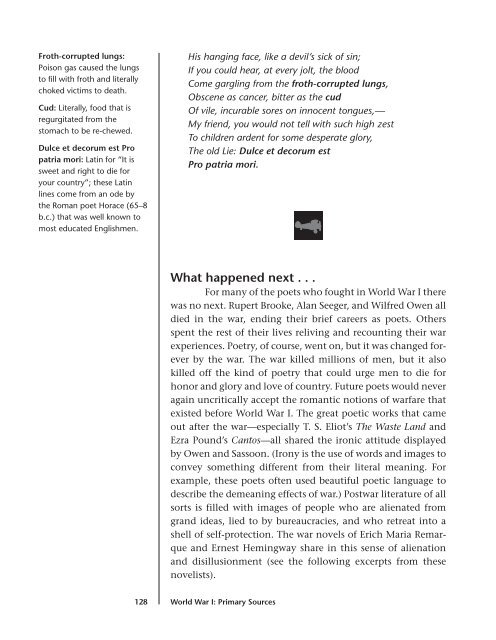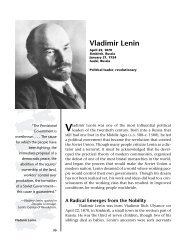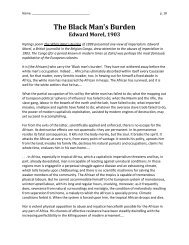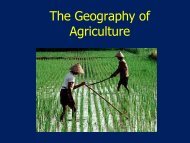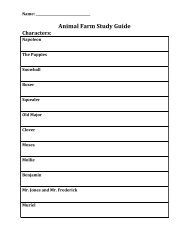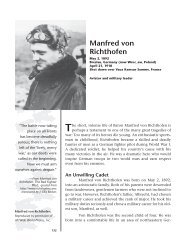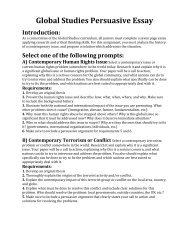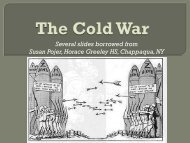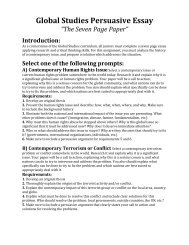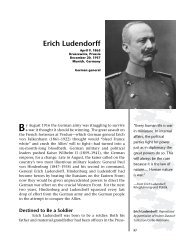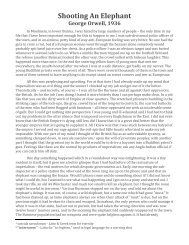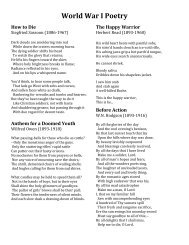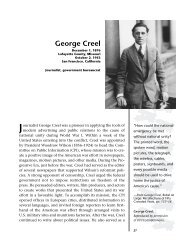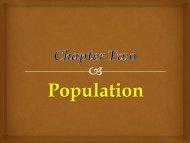Poetry of World War I
Poetry of World War I
Poetry of World War I
You also want an ePaper? Increase the reach of your titles
YUMPU automatically turns print PDFs into web optimized ePapers that Google loves.
Froth-corrupted lungs:<br />
Poison gas caused the lungs<br />
to fill with froth and literally<br />
choked victims to death.<br />
Cud: Literally, food that is<br />
regurgitated from the<br />
stomach to be re-chewed.<br />
Dulce et decorum est Pro<br />
patria mori: Latin for “It is<br />
sweet and right to die for<br />
your country”; these Latin<br />
lines come from an ode by<br />
the Roman poet Horace (65–8<br />
b.c.) that was well known to<br />
most educated Englishmen.<br />
His hanging face, like a devil’s sick <strong>of</strong> sin;<br />
If you could hear, at every jolt, the blood<br />
Come gargling from the froth-corrupted lungs,<br />
Obscene as cancer, bitter as the cud<br />
Of vile, incurable sores on innocent tongues,—<br />
My friend, you would not tell with such high zest<br />
To children ardent for some desperate glory,<br />
The old Lie: Dulce et decorum est<br />
Pro patria mori.<br />
What happened next . . .<br />
For many <strong>of</strong> the poets who fought in <strong>World</strong> <strong>War</strong> I there<br />
was no next. Rupert Brooke, Alan Seeger, and Wilfred Owen all<br />
died in the war, ending their brief careers as poets. Others<br />
spent the rest <strong>of</strong> their lives reliving and recounting their war<br />
experiences. <strong>Poetry</strong>, <strong>of</strong> course, went on, but it was changed forever<br />
by the war. The war killed millions <strong>of</strong> men, but it also<br />
killed <strong>of</strong>f the kind <strong>of</strong> poetry that could urge men to die for<br />
honor and glory and love <strong>of</strong> country. Future poets would never<br />
again uncritically accept the romantic notions <strong>of</strong> warfare that<br />
existed before <strong>World</strong> <strong>War</strong> I. The great poetic works that came<br />
out after the war—especially T. S. Eliot’s The Waste Land and<br />
Ezra Pound’s Cantos—all shared the ironic attitude displayed<br />
by Owen and Sassoon. (Irony is the use <strong>of</strong> words and images to<br />
convey something different from their literal meaning. For<br />
example, these poets <strong>of</strong>ten used beautiful poetic language to<br />
describe the demeaning effects <strong>of</strong> war.) Postwar literature <strong>of</strong> all<br />
sorts is filled with images <strong>of</strong> people who are alienated from<br />
grand ideas, lied to by bureaucracies, and who retreat into a<br />
shell <strong>of</strong> self-protection. The war novels <strong>of</strong> Erich Maria Remarque<br />
and Ernest Hemingway share in this sense <strong>of</strong> alienation<br />
and disillusionment (see the following excerpts from these<br />
novelists).<br />
128 <strong>World</strong> <strong>War</strong> I: Primary Sources


